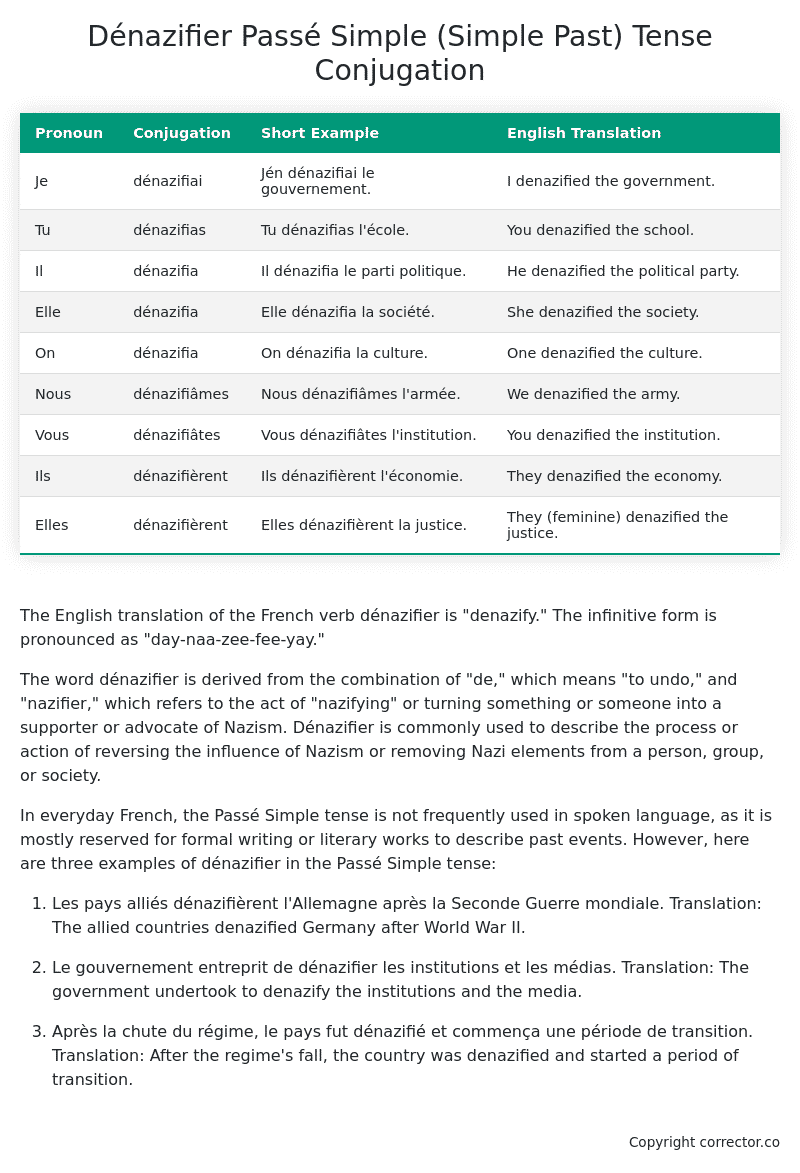Passé Simple (Simple Past) Tense Conjugation of the French Verb dénazifier
Introduction to the verb dénazifier
The English translation of the French verb dénazifier is “denazify.” The infinitive form is pronounced as “day-naa-zee-fee-yay.”
The word dénazifier is derived from the combination of “de,” which means “to undo,” and “nazifier,” which refers to the act of “nazifying” or turning something or someone into a supporter or advocate of Nazism. Dénazifier is commonly used to describe the process or action of reversing the influence of Nazism or removing Nazi elements from a person, group, or society.
In everyday French, the Passé Simple tense is not frequently used in spoken language, as it is mostly reserved for formal writing or literary works to describe past events. However, here are three examples of dénazifier in the Passé Simple tense:
-
Les pays alliés dénazifièrent l’Allemagne après la Seconde Guerre mondiale.
Translation: The allied countries denazified Germany after World War II. -
Le gouvernement entreprit de dénazifier les institutions et les médias.
Translation: The government undertook to denazify the institutions and the media. -
Après la chute du régime, le pays fut dénazifié et commença une période de transition.
Translation: After the regime’s fall, the country was denazified and started a period of transition.
Table of the Passé Simple (Simple Past) Tense Conjugation of dénazifier
| Pronoun | Conjugation | Short Example | English Translation |
|---|---|---|---|
| Je | dénazifiai | Jén dénazifiai le gouvernement. | I denazified the government. |
| Tu | dénazifias | Tu dénazifias l’école. | You denazified the school. |
| Il | dénazifia | Il dénazifia le parti politique. | He denazified the political party. |
| Elle | dénazifia | Elle dénazifia la société. | She denazified the society. |
| On | dénazifia | On dénazifia la culture. | One denazified the culture. |
| Nous | dénazifiâmes | Nous dénazifiâmes l’armée. | We denazified the army. |
| Vous | dénazifiâtes | Vous dénazifiâtes l’institution. | You denazified the institution. |
| Ils | dénazifièrent | Ils dénazifièrent l’économie. | They denazified the economy. |
| Elles | dénazifièrent | Elles dénazifièrent la justice. | They (feminine) denazified the justice. |
Other Conjugations for Dénazifier.
Le Present (Present Tense) Conjugation of the French Verb dénazifier
Imparfait (Imperfect) Tense Conjugation of the French Verb dénazifier
Passé Simple (Simple Past) Tense Conjugation of the French Verb dénazifier (You’re reading it right now!)
Passé Composé (Present Perfect) Tense Conjugation of the French Verb dénazifier
Futur Simple (Simple Future) Tense Conjugation of the French Verb dénazifier
Futur Proche (Near Future) Tense Conjugation of the French Verb dénazifier
Plus-que-parfait (Pluperfect) Tense Conjugation of the French Verb dénazifier
Passé Antérieur (Past Anterior) Tense Conjugation of the French Verb dénazifier
Futur Antérieur (Future Anterior) Tense Conjugation of the French Verb dénazifier
Subjonctif Présent (Subjunctive Present) Tense Conjugation of the French Verb dénazifier
Subjonctif Passé (Subjunctive Past) Tense Conjugation of the French Verb dénazifier
Subjonctif Imparfait (Subjunctive Imperfect) Tense Conjugation of the French Verb dénazifier
Subjonctif Plus-que-parfait (Subjunctive Pluperfect) Tense Conjugation of the French Verb dénazifier
Conditionnel Présent (Conditional Present) Tense Conjugation of the French Verb dénazifier
Conditionnel Passé (Conditional Past) Tense Conjugation of the French Verb dénazifier
Conditionnel Passé II (Conditional Past II) Tense Conjugation of the French Verb dénazifier
L’impératif Présent (Imperative Present) Tense Conjugation of the French Verb dénazifier
L’impératif Passé (Imperative Past) Tense Conjugation of the French Verb dénazifier
L’infinitif Présent (Infinitive Present) Tense Conjugation of the French Verb dénazifier
L’infinitif Passé (Infinitive Past) Tense Conjugation of the French Verb dénazifier
Le Participe Présent (Present Participle) Tense Conjugation of the French Verb dénazifier
Le Participe Passé (Past Participle) Tense Conjugation of the French Verb dénazifier
Struggling with French verbs or the language in general? Why not use our free French Grammar Checker – no registration required!
Get a FREE Download Study Sheet of this Conjugation 🔥
Simply right click the image below, click “save image” and get your free reference for the dénazifier Passé Simple tense conjugation!

Dénazifier – About the French Passé Simple (Simple Past) Tense
Formation
Usage
Narration
Historical Context
Interactions with other tenses
Passé Composé
Imparfait
Conditional and Subjunctive
Summary
I hope you enjoyed this article on the verb dénazifier. Still in a learning mood? Check out another TOTALLY random French verb conjugation!


